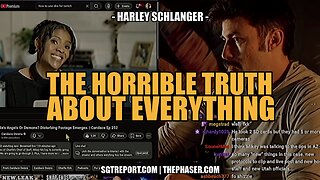Premium Only Content

Outrage: “Drag” Show with Minors Rekindles Debate on Child Protection
The circulation of a video showing a person dressed in a provocative outfit performing in front of an audience that includes preschoolers has sparked a wave of outrage among parents, conservative organizations, and public figures. Beyond the show itself and its theatrical aspects, what deeply concerns large sectors of society is the exposure of young children to clearly adult-themed content and the permissiveness of both the organizers and local authorities.
The incident, which occurred at a community center during a public event, shows an adult wearing suggestive clothing performing movements intended for a mature audience, while several children watch from the front row. The footage, widely shared on social media, provoked immediate backlash. Alarmed parents demanded explanations from the organizers and accountability from institutions that allowed events of this nature to take place in venues where minors were present.
Legitimate Concern for Child Safety and Development
From a child-protection standpoint, the main criticism is not about the artists’ orientation or identity, but about the appropriate limits for activities involving children. Developmental psychologists remind us that the preschool age is a sensitive stage in which premature exposure to sexualized content can cause confusion, normalize inappropriate behaviors, and pose risks to the emotional well-being of minors.
For this reason, parents and conservative civic organizations have raised specific questions: What criteria did the organizers use to authorize the presence of children? Was informed consent obtained from families? Was there a prior assessment of the show’s nature and its suitability for minors? The absence of clear answers has fueled distrust and the perception of negligence that cannot be ignored.
Responsibility of Organizers and Authorities
The controversy highlights the accountability of community centers, schools, and sponsors that allow or promote mixed-audience events. Many conservative voices are calling for public and private institutions to adopt clear policies that protect minors: explicitly banning adult-themed performances at family events, requiring separation between adult and children’s activities, and mandating prior review and authorization of any outsourced performances held in family-accessible facilities.
In addition, local governments are being urged to strengthen oversight and impose sanctions whenever violations of child-protection standards are confirmed. The State has a key role: ensuring that public spaces are safe and suitable for children, and that they are not used as platforms to normalize potentially harmful content.
Call for Calm Debate and Concrete Action
The public reaction also includes an appeal to avoid turning this incident into a culture war driven by insults, and instead view it as an opportunity to legislate and clarify responsibilities. Proposals advanced by conservative groups and parent associations include:
• Clearly regulating what types of performances are allowed at family-friendly events or educational/recreational facilities attended by minors.
• Requiring organizers to follow authorization and prior communication protocols with families, including explicit warnings about content.
• Increasing the training of community center and school staff to identify risks and protect minors.
• Enforcing administrative or contractual penalties when negligence by organizers is proven.
Protection Without Stigmatization: A Responsible Stand
It is possible to criticize and demand child protection in a serious and responsible way without resorting to personal attacks or stigmatization. The priority agenda must focus on ensuring children’s physical and psychological safety, organizer transparency, and accountability from those managing public spaces.
Ultimately, this is not merely an ideological dispute—it is, above all, a matter of common sense and social responsibility. The reaction of parents and communities—and their demand for responses from authorities—demonstrates that society expects clear limits when it comes to exposing minors to adult-oriented content. Any political decision moving forward must prioritize the protection of the most vulnerable and establish a legal and administrative framework that prevents the recurrence of incidents of this nature.
-
 4:19
4:19
PistonPop-TV
6 days ago $2.34 earnedThe 4E-FTE: Toyota’s Smallest Turbo Monster
11.2K -
 43:07
43:07
WanderingWithWine
6 days ago $1.29 earned5 Dreamy Italian Houses You Can Own Now! Homes for Sale in Italy
9.84K2 -
 LIVE
LIVE
Spartan
21 hours agoFirst playthrough of First Berserker Khazan
249 watching -
 28:01
28:01
Living Your Wellness Life
2 days agoTrain Your Hormones
12.5K1 -
 43:28
43:28
The Heidi St. John Podcast
1 day agoFan Mail Friday: Faith Over Fear and Finding Strength in Every Season
6.79K -
 1:05:30
1:05:30
SGT Report
1 day agoTHE HORRIBLE TRUTH ABOUT EVERYTHING -- Harley Schlanger
48.7K91 -
 11:04
11:04
Blackstone Griddles
17 hours agoCountry Fried Steaks on the Blackstone Griddle
92.7K14 -
 49:47
49:47
Brad Owen Poker
1 day agoI Get My First BIIGGG Win! $25,000+ Buy-in! HORSE Championship! Don’t Miss! Poker Vlog Ep 324
17K1 -
 9:53
9:53
Rethinking the Dollar
1 day agoWhen Detroit Bleeds, America Suffer! Layoffs Have Begun
21.9K32 -
 18:36
18:36
Clownfish TV
1 day agoYouTube Just NERFED YouTube Gaming... | Clownfish TV
23.3K32